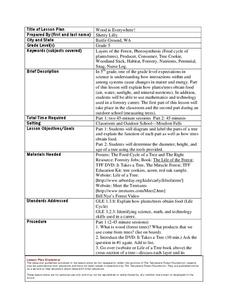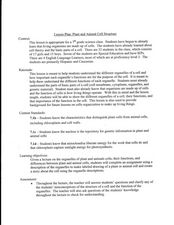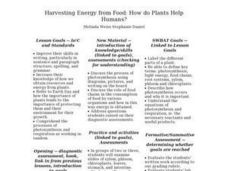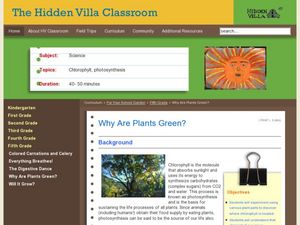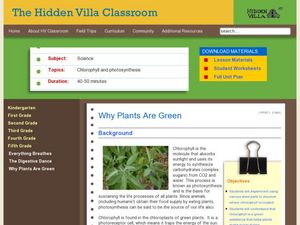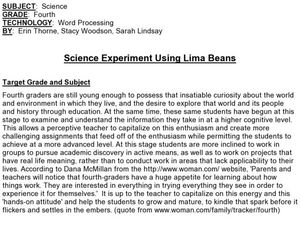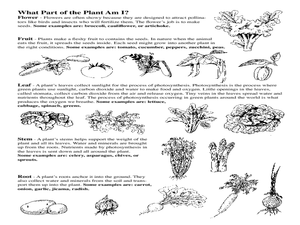Curated OER
Seed to Plant
Young scholars understand the stages of a plants life. For this stages of plant development lesson, students read about bean plants and grow their own. Young scholars record growth and photograph changes in their plants. Students label...
Curated OER
All About Plants
Learners identify plant needs. In this biology lesson, students watch All About Plants and then write a paragraph describing the various details about plants.
Curated OER
Science Processes
Fifth graders observe a dry piece of bread and a damp piece of bread in two separate sealed bags that have been sitting for several days that have been labeled. The observe the mold with a hand lens and record findings in their science...
Curated OER
Wood is Everywhere!
Fifth graders diagram and label the parts of a tree. For this lesson on how trees obtain food, 5th graders diagram and label the parts of a tree, and determine the diameter, height, and age of a tree.
Curated OER
The Global Impact of Insect Borne Diseases & Agriculture
Students study the global impact of insect borne diseases, the appropriate use of pesticides, and the concept of human interrelations on a world wide scale. They examine how to safely apply a pesticide, according to the label.
Curated OER
Aquatic Ecosystems
Ninth graders record information on aquatic ecosystems and create a labeled diagram of an ecosystem of their choice. They can choose from an ocean zone, estuary, river, lakes, or beaches. The student has to explain their biome of choice.
Curated OER
Ecology: Trees
Fourth graders research and identify the different layers of the forest. As a class, they observe real-life trees or analyze a poster, and discuss the characteristics of each forest layer. Students then draw a forest and label the...
Curated OER
Plant and Animal Cell Structure
Seventh graders identify the different parts and functions of the cell. In this biology lesson, 7th graders make a labelled diagram of either a plant or animal cell. They write a story about it.
Curated OER
What's Special About Nonfiction?
Students examine the difference between nonfiction and fictional writing. They identify the characteristics of nonfiction literature and examine how a nonfiction textbook organizes information.
Curated OER
Harvesting Energy from Food: How do Plants Help Humans?
Beginning botanists view slides of plant vascular tissue. They watch Magic School Bus Gets Planted, which you can find online, and then write a summary of what they have learned about plants. This lesson could be used with upper...
Curated OER
Carbon Dioxide - Sources and Sinks
Where does all of the carbon dioxide come from that is supposedly leading to climate change? Earth science pupils test animal, plant, and fossil fuels as sources in this investigation. Using an indicator, BTB, they are able to detect the...
Curated OER
Why Are Plants Green?
Students smash plant parts and wait for visibility of chlorophyl to show why plants turn green. In this green plants lesson plan, students use acetone and filter paper for this experiment.
Curated OER
Why Plants Are Green
Students discover the properties of chlorophyll in plants. In this plant biology lesson, students conduct an experiment to find where the chlorophyll in the plant is located. Students are split into small groups and study plant parts....
Curated OER
Digital Mitosis and Claymation
Take mitosis and meiosis out of the biology textbook and onto the screen! An innovative class project prompts young biologists to create an animation movie using clay, showing the phases involved in mitosis or meiosis by moving the...
Curated OER
Wetland Food Webs
Students study life science. In this food webs and food chains comparison lesson, students examine the wetlands to discover the relationships that exist between the animals that live there. They participate in group activities and...
Curated OER
Plant Classfications
Seventh graders observe and discuss as a class the different types of vascular plants. They examine the different parts of the plant and some of the processes occurring in plants with activities accompanying.
Curated OER
Plant Structure, Function and Growth
Students study three structures of a plant as well as their locations and functions. In this botany lesson students complete several activities on plant organs and their functions.
Curated OER
Science Experiment Using Lima Beans
Fourth graders tie together elements about the world and their environment. Students incorporate styles of higher order thinking skills. Students measure skills of observations, conclusions, inferences and predictions.
Curated OER
Cell-ebrations in Science
Students recognize that all living things are made up of cell and that they cannot easily be seen by the naked eye. Students become familiar with the use of microscopes as a tool for investigation.
Curated OER
Breathe In, Breath Out
Students discover how plants breathe. In this biology lesson plan, students learn that plants take in carbon dioxide and find that plants need sunlight to absorb the carbon dioxide.
Curated OER
Coral Mania
Students examine deep-sea coral. In this coral lesson, students identify the structure and function of a coral polyp. Students then create a model of a coral polyp.
Curated OER
Smog Be Gone
Students begin the instructional activity by identifying greenhouse gases. In groups, they observe and record the effect of the gases on the atmosphere and the temperature of the Earth. They participate in activities that describe the...
Curated OER
Plant Party
Students identify plant parts. In this plants lesson, students bring in a vegetable. Each student classifies which part of the plant their vegetable comes from (flower, root, ect.) Students identify the parts of their vegetable and later...
Curated OER
Tree Bagging
Students bag trees to determine the mass of the water given off in the evapotranspiration process.





